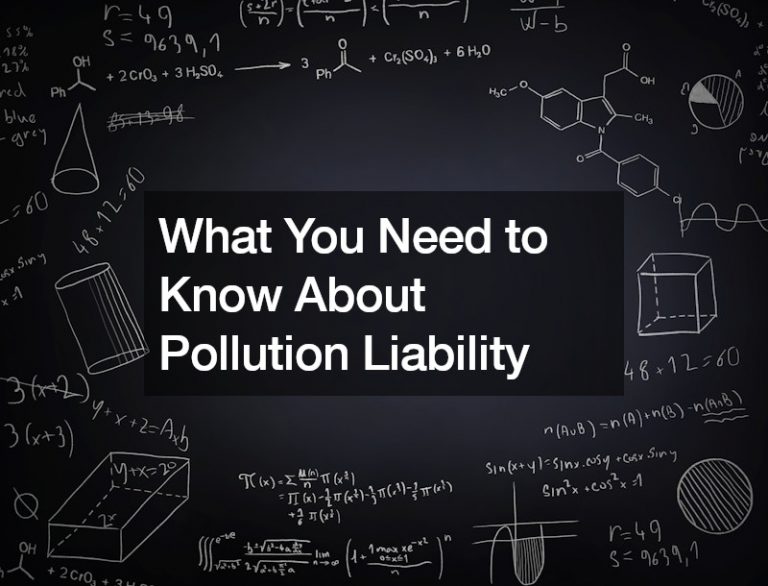In a world increasingly aware of environmental concerns, businesses face growing pressure to mitigate their impact on the planet. One vital aspect of this responsibility is understanding pollution liability, often referred to as pollution liability insurance. Whether you’re a seasoned entrepreneur or a budding startup, grasping the fundamentals of environmental insurance is essential. So, let’s delve into what you need to know.
Understanding Pollution Liability
Firstly, what exactly is environmental insurance? In simple terms, it’s a type of coverage that safeguards businesses from financial losses resulting from pollution-related incidents. These incidents could range from accidental chemical spills to emissions violations. Essentially, environmental insurance acts as a safety net, shielding businesses from the potentially crippling costs of environmental damage and cleanup.
Why Environmental Insurance Matters
Now, you might wonder why environmental insurance is necessary. Well, the reality is that environmental accidents can happen to any enterprise, regardless of size or industry. Even with strict safety measures in place, unforeseen circumstances can lead to pollution incidents. Without proper coverage, businesses take the risk facing hefty fines, legal fees, and cleanup expenses. This is where environmental insurance steps in, offering financial protection and peace of mind.
Applicability Across Industries
It’s important to note that environmental insurance isn’t just for heavy industries or hazardous materials handlers. Any business that owns or operates property, handles chemicals, or deals with waste could benefit from this coverage. From manufacturing plants to office buildings, there are numerous environmental risks that exist in various forms and can result in substantial liabilities if left unaddressed.
Types of Coverage Offered
Now, let’s talk about the types of coverage offered under environmental insurance policies. Generally, these policies can include pollution liability coverage, remediation cost coverage, and legal defense coverage.
Pollution Liability Coverage
This type of coverage is the cornerstone of environmental insurance policies. It offers financial protection in case of pollution incidents that cause bodily injury, property damage, or environmental harm. This coverage helps businesses cover the costs of cleanup, remediation, and legal liabilities arising from pollution-related accidents. Whether it’s a spill at a manufacturing facility or contamination from improper waste disposal, this liability coverage ensures that businesses are not left shouldering the financial burden alone.
Remediation Cost Coverage
Remediation cost coverage specifically focuses on the expenses associated with restoring contaminated sites. In the aftermath of a pollution incident, cleanup and remediation efforts can be extensive and costly. This coverage helps businesses cover the expenses related to soil and water remediation, waste disposal, and restoration of affected ecosystems. By providing financial support for cleanup efforts, remediation cost coverage enables businesses to fulfill their environmental obligations while minimizing financial strain.
Legal Defense Coverage
Legal defense coverage is another essential component of environmental insurance policies. In the event of a pollution incident, businesses may face lawsuits, regulatory actions, or enforcement proceedings. Legal defense coverage helps businesses cover the costs of legal representation, court fees, and settlement expenses. Whether it’s defending against claims of negligence or negotiating with regulatory agencies, legal defense coverage ensures that businesses have the resources to protect their interests and navigate the complexities of environmental litigation.
The Importance of Consulting with Experts
Understanding the scope of coverage is crucial for businesses when selecting an environmental insurance policy. Consulting with a commercial lawyer can provide invaluable insight into the intricacies of these policies. A knowledgeable lawyer can help businesses navigate the complexities of environmental insurance contracts and ensure that their interests are protected.
Managing Commercial Disputes
Moreover, enterprises should be aware of the potential for commercial disputes related to environmental insurance claims. In the event of a pollution incident, disputes may arise between insurers, policyholders, and third parties. These disputes could involve disagreements over coverage limits, liability allocation, or the extent of damages. Resolving such disputes may require commercial litigation to reach a fair and acceptable outcome for all parties involved.
Navigating Pollution Liability in an Efficient Way
In conclusion, environmental insurance is a vital tool for businesses seeking to manage their environmental risks effectively. By investing in comprehensive coverage, businesses can safeguard themselves against the financial repercussions of pollution incidents. However, navigating the world of environmental insurance requires careful consideration and guidance from experts like Mary Lopatto. Consulting with a commercial lawyer can help businesses make knowledgeable decisions and protect their interests in the face of potential commercial disputes.




